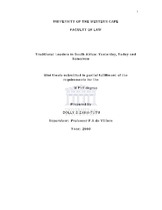| dc.description.abstract | Traditional leaders were occupying communal political positions sanctified by cultural mores and values who enjoy the legitimacy of particular communities to direct their affairs. Their basis of legitimacy is tradition, which includes the whole range of inherited culture and way of life, a people's history, moral and social values and the traditional institutions which survive to serve those values. As stated by Bennett, the structure of tribes contained no more than a few thousand indivuduals. Members were assumed to be related by a tie of kinship and due to their ancestry, they were a homogenious group. They were three rungs in the hierarchy of traditional leadership, the Kumkani (King), the Nkosi (or Chief, a term the traditional leaders do not like because it is of colonial imposition), and the lowest rung called the Headman or junior traditional leader. Traditional rulers required no special training as they were qualified for office by their ansestry alone; a king is a king because he is born to it. Furthermore, the all inclusive powers of government were not differentiated, in the Western manner, into judicial, administrative and legislative categories. In South Africa the office was hereditary according to the principle of primogeniture in the male line. There was a duty to consult councillors and to act for the benefit of the people. Even though many of the issues of traditional leadership were similar across the country, it must be accepted that traditional leadershipis the expression of different nations. Each African nation had a dirresent system of customary law and different models of traditional societal organisation in which traditional leadership plays diferent roles. If the grip of traditional leaders on the masses of the people were not broken, it would not be easy for colonial powers to get a listening ear from the people and therefore to govern as they saw fit. | en_US |

